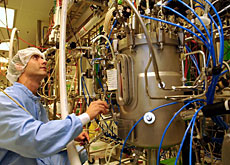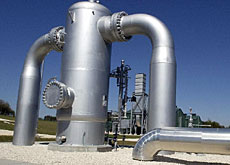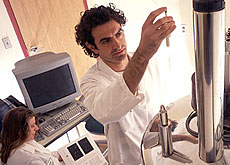Doubts remain as Serono reports record profits

Europe’s largest biotechnology company, Serono, has reported record results for 2004 – but has failed to allay doubts about longer-term earnings prospects.
Full-year net profit rose 27 per cent to $494.2 million (SFr588 million), on revenue of $2.46 billion (up 22 per cent).
The results, which were driven largely by the Geneva-based company’s flagship multiple sclerosis drug, Rebif, were roughly in line with analysts’ expectations.
Sales of Rebif were slightly higher than average forecasts, climbing 33 per cent to $1.09 billion – 45 per cent of total revenue.
Sales of fertility drug Gonal-f, Serono’s second-biggest product, rose 2.2 per cent to $151.1 million, or 28.5 per cent of the total.
None of the company’s other top ten products accounted for more than ten per cent of sales.
Pipeline prospects?
At the same time Serono reported a 20 per cent drop in fourth quarter profit, as higher research and development costs – not least the cost of launching new psoriasis drug Raptiva – offset increased sales of Rebif.
Over the past year or so, investors have expressed repeated concerns about lack of longer-term “pipeline” development prospects, and the share price has dropped about 25 per cent since this time last year.
There are also growing concerns that a new rival multiple sclerosis drug, Tysabri, will hurt Serono’s earnings prospects.
However, Serono says it has several “promising” new products in late-stage trials that will drive future growth.
Referring to Tysabri, CEO Ernesto Bertarelli described the market entry of a new competitor as “a chance to consolidate our position”.
He said the rival drug would probably be positioned as “a third line therapy for patients who have failed other drugs”.
US market
Bertarelli added that Serono intends to retain its leading 36 per cent of the multiple sclerosis market outside the United States and to achieve a “dominant” share of the US market by 2006, where it currently has a share of 17 per cent.
Looking ahead to 2005, he projected net profit of between $520 and $540 million, on revenue of at least $2.6 billion.
Serono shares are currently trading at a price-earnings ratio of about 18, below the average for the biotechnology sector.
The price-earnings ratio is a commonly used ratio, which indicates market estimations of a company’s longer-term earnings potential.
swissinfo with agencies
2004 net profit rose 27% to $494.2 million, on revenue of $2.46 billion (up 22%).
But the results barely satisfied analysts, who express doubts about Serono’s dependence on MS drug Rebif and longer-term development prospects.
The share price has dropped 25% in a year, reflecting shareholder expectations below the average for the sector.

In compliance with the JTI standards
More: SWI swissinfo.ch certified by the Journalism Trust Initiative










You can find an overview of ongoing debates with our journalists here . Please join us!
If you want to start a conversation about a topic raised in this article or want to report factual errors, email us at english@swissinfo.ch.